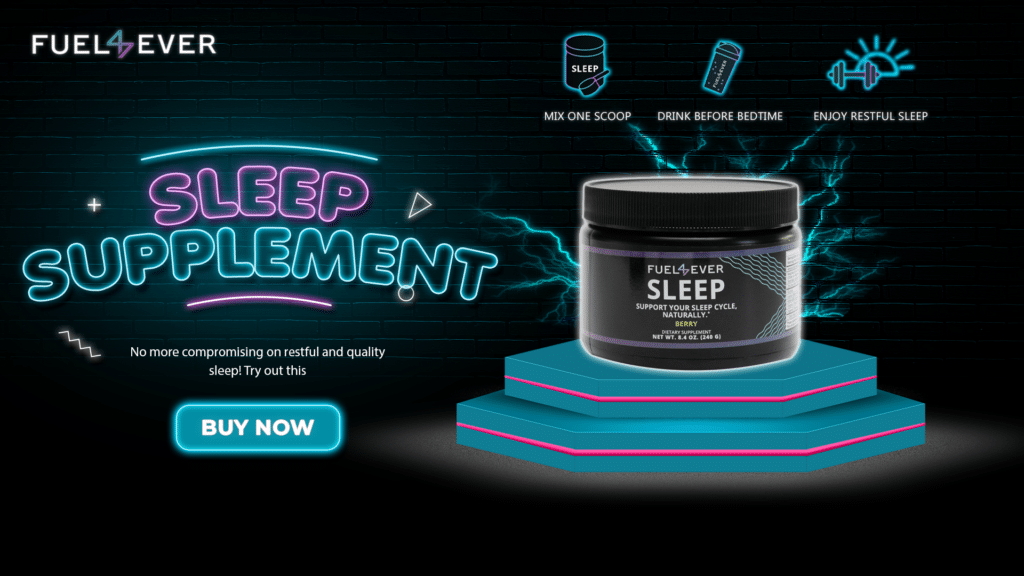Sleep deprivation is a common phenomenon that many people experience at one or another corners in their lives. It occurs when an individual does not get enough or fails to obtain restful sleep, leading to various physical and mental effects. Understanding the concept of sleep deprivation and its impact on our well-being is crucial for maintaining a healthy lifestyle.
Lack of sleep can have a serious negative impact on your overall health. Here we will be exploring how to recognise the symptoms and handle the situation in a positive manner, including the use of supplements for sleep.
In this particular article, we will also be inspecting significant pointers on the following topic to conclude the solutions and overcome this scenario.
Do You Need More Sleep?
Most of us know how we feel after a night of poor or no sleep. You don’t feel like yourself; you are sleepy, lethargic, agitated, and low in energy. You are facing issues while concentrating on your work, having cloudy thinking, and will need copious amounts of coffee to get through the day until you can retire to bed at night.
Even though dealing with the odd night of disrupted sleep can be uncomfortable. If you consistently skip out on a restful night of sleep, you could be significantly harming your health and quality of life. Lack of sleep can badly harm your immune system, heart, and brain health. And it will also impact the ability to handle stress and performance at work or school. In addition it can have a destructive impact on your mood, energy, and disposition. It can result in more waistline inches, a higher chance of mishaps. And significant long-term health issues like diabetes, hypertension, heart disease, stroke, anxiety, and depression.
People may find it helpful in some situations to explore the usage of supplements for sleep as a potential aid in enhancing sleep quality. Ingredients like melatonin, valerian root, or chamomile, which are well known for their relaxing and sleep-inducing effects, may be present in these supplements. But it is recommended to ensure safety and efficacy before opting for the same. And it is crucial to speak with a healthcare expert to avoid any consequences.
However, the first step to resolving the issue and ensuring you receive enough sleep to safeguard your well-being and function at your best is understanding sleep deprivation’s signs, causes, and effects.
How Much Sleep Is Considered Sufficient?
As per the studies, every individual has different sleep needs. The average adult needs seven to nine hours of sleep every night, with children and teenagers needing even more and older adults occasionally needing a bit less.
However, suppose you don’t get that much sleep regularly. In that case, you may be sleep deprived—even if you’re not aware of the subtle effects it may have on your mood, personality, and performance or the potential long-term implications.
The quality of your slumber will be diminishing, which may exacerbate the signs of sleep deprivation if you are interrupted by noise, light, or physical pain. You are also preventing yourself from spending enough time in the different stages of sleep. Especially the deep restorative sleep and REM sleep periods.
Symptoms Of Sleep Deprivation
Symptoms: You might not be getting enough sleep:
- Feeling sluggish, cranky, and worn out during the day, frequently yawning.
- Unable to concentrate or recall information or details.
- Having trouble getting out of bed in the morning, requiring an alarm clock to get up on time, or frequently hitting the snooze button.
- Usually in the afternoon, you are feeling dizzy or sleepy.
- Find it challenging to stay awake at meetings, lectures. In warm environments, when driving or commuting, or after a substantial meal.
- You require a nap during the day.
- In the evening, drift off to sleep on the couch.
- Have gone through mood swings, such as feeling down, nervous, agitated, paranoid, or suicidal.
The following can be the symptoms of sleep deprivation. And signs to make a wakeup call to modify your lifestyle according to health beneficial scenarios.
Sleep Deprivation Stages
Even while it might not seem like a huge deal to miss out on your sleep. It has many detrimental repercussions beyond just being drowsy during the day, the sleep deprivation stages comprise:
- Energy Fluctuates: Being worn out, lazy, and lacking motivation at job, school, and at home. You might feel like you want to sleep all day.
- Illnesses Of The Mind: Lack of sleep can affect your disposition and irritability and increase your susceptibility to depression and anxiety. Making it more difficult for you to cope with stress or difficult emotions; it may even cause delirium and hallucinations.
- Compromised Immunity: You might be more susceptible to infections, recurring colds, or respiratory diseases.
- Difficulties With Memory: Concentration, and learning brought on by diminished brain activity. Lack of sleep can decrease creativity and problem-solving abilities in addition to affecting judgment, coordination, and reaction times.
- Cardiovascular System Effects: Lack of sleep increases the risk of heart disease by increasing blood pressure, blood sugar and damaging inflammation.
- Impact On Appearance: Such as weight gain and early skin aging.

Insomnia Is Brought On By: Sleep Deprivation Causes
There are thousands of sleep deprivation causes ranging from your daytime routines and sleeping surroundings to disruptions brought on by stress, travel, or sickness.
The following list includes some of the most typical sleep deprivation causes:
- Stress and concern are out of control, as we live in difficult times. And many are concerned about their careers, financial situations, or the health and well-being of ourselves or our loved ones. Most probably, you have other things to occupy your time during the day. So you’re rarely alone with your anxious thoughts until you lie down to sleep at night. Worrying about events that have already occurred or could occur in the future is the easiest way to ruin a good night’s sleep. As per the facts, 60% of the time, this will only be the reason for sleepless nights in youngsters.
- Working a shift can disrupt your circadian rhythms or 24-hour sleep-wake cycle, leaving you drained and confused. If you often work evening, early morning, or rotating shifts. You might not get as good of a night’s sleep as you would if you worked a conventional daytime shift.
- Bad sleeping conditions or destructive daytime behaviors; your actions during the day are frequently the cause of poor or insufficient sleep at night. Poor sleep can be caused by various factors. Including excessive caffeine intake, insufficient exercise, screen time immediately before bed, or simply a warm, noisy, or bright bedroom.
- Usage of drugs; while drinking alcohol may make it easier to fall asleep, it can also cause sleep disruptions such as louder snoring, disruptions to the REM sleep period, and earlier-than-usual awakenings. Additionally, stimulants like cocaine or amphetamines can prevent you from falling asleep and keep you awake at night.
- Health problems, your sleep issues could have a medical reason, such as chronic pain, heartburn, thyroid disease, or mental health problems like depression, anxiety, or bipolar disorder. Fragmented sleep is common in older persons with dementia. And recent reports of long-haul COVID have also been connected to it. The adverse effects of some drugs can also bring on sleep issues.
Taking Action To Alleviate Or Prevent Sleep Deprivation
It’s time to take action to get the sleep you require if you frequently wake up exhausted and feel drained throughout the day. It may be tempting just to take medication when you need sleep. Without resorting to drugs, there are many things you may do to increase the quantity and quality of your sleep:
- While sleeping pills or other sleep aids may be helpful in the short term. They are not a cure and do not address the root causes of your sleep problem. In fact, over time, they may even exacerbate your symptoms. To treat sleep deprivation and get your sleep schedule back on track, you may make several lifestyle and behavioral modifications.
- Calm your restless thoughts during the night, and spend the hour before bed without using screens, working, or having tense conversations. Create a sleep ritual that lets you unwind and calm your mind. Take a warm bath, listen to relaxing music or audiobooks, read in low light, or try a relaxation exercise like progressive muscle relaxation, deep breathing, or meditation.
- Postpone your worries, make a quick list of your problems on paper if you worry all night. Then, permit yourself to put off worrying until the next day. You’ll be much better equipped to address the issue after a restful night’s sleep.
- Eliminate tension; whatever the source of your stress. You may learn healthy stress management techniques to reduce tension and anxiety and enhance your sleep quality.
- Exercise consistently; regular exercise is not only a fantastic stress reliever. But may also aid with mood enhancement and reduce the signs of many sleep disorders. On most days, aim to spend at least 30 minutes active—but avoid exercising too close to bedtime, or you might have trouble falling asleep.
- Keep to a regular sleeping pattern; your biological clock will be supported. If you go to bed and rise simultaneously every day, including on weekends.
- Lessen the effects of shift work, utilizing bright lights to enhance your exposure to light while working and reducing it when it’s time to go to bed at home can help you balance your sleep-wake cycle. Use heavy drapes or blackout shades to keep your bedroom dark during the day.
- Keep an eye on what you consume, you can have trouble falling asleep at night if you consume many sweet foods, alcohol, and caffeine during the day. A heavy meal just before bedtime might make it difficult to fall asleep. And drinking a lot of liquids can keep you awake.
Final Thoughts
There are several reasons why people experience sleep deprivation, including dietary habits, work obligations, physical ailments, and sleep disorders. The fast-paced nature of contemporary culture and ongoing exposure to technology have substantially impacted the prevalence of sleep deprivation.
When it comes to improving sleep quality, certain dietary supplements can play a beneficial role. Among them, magnesium has gained attention as one of the best supplements for sleep. Incorporating magnesium-rich foods in your diet or considering the use of the best magnesium for sleep under professional guidance may help promote better sleep.
Giving the final thoughts, preventing sleep deficit includes realizing the importance of getting quality rest and taking steps to sustain it. People can enhance their sleeping patterns and general quality of life by being aware of their signs, causes, and stages.
